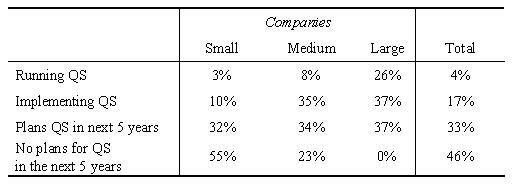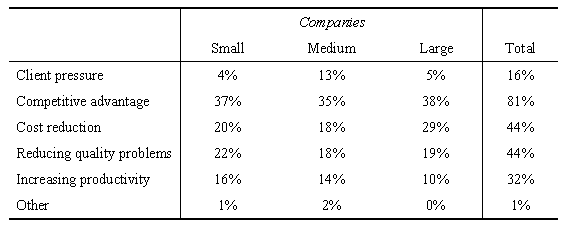Table 1: Current State Regarding Quality Systems Companies Small
Medium Large Total Running

|
Curado.com
|
Curado, M.T.; Dias, L.M. (1995), "Quality Management
in Portuguese Construction Companies - The Attitude Towards Certification",
in Proceedings of the XXIII IAHS World Housing Congress - Volume 3, International
Association for Housing Science/National University of Singapore, Singapura.
QUALITY MANAGEMENT IN PORTUGUESE CONSTRUCTION COMPANIES - THE ATTITUDE TOWARDS CERTIFICATION
Miguel T. Curado and L. M. Alves Dias
Department of Civil Engineering Instituto Superior Técnico - Technical University of Lisbon Av. Rovisco Pais - P-1096 Lisbon, PortugalThere is no tangible evidence that certification improves the companies' performance. At the moment, in our country most clients are still not demanding third part certification but there are some signs that this will change in the very near future.
As there are a number of Portuguese construction companies working towards certification, it is important to know: (i) whether they are just anticipating the client's requirements; (ii) or are truly committed to quality and better management through certification.
To assess the motivations and expectations leading the process, a survey was carried out with the co-operation of the main Portuguese builders' and contractors' associations. The aim of this paper is to analyse the results of this survey and discuss the appropriateness of certification to construction companies as well as its advantages and drawbacks.
It is important to go beyond the superficial images recently created, often by major spending on marketing to the real value of the different approaches to quality. These must be evaluated, in order to avoid errors caused by the narrow view of wider realities or by temporary demands or fashions.
In this, the last decade of the millennium, much ink and many working hours have been dedicated to the subject of third party certification of construction companies, both by managers and researchers.
Some recent studies, establish for construction companies, a positive correlation between the implementation of quality management systems satisfying the requirements of certification schemes and financial performance [2], cost reductions [3] and productivity [4]. Still, this is not a settled issue, other authors consider certification and the ISO 9000 standards with great reservation, emphasising aspects like bureaucracy, inflexibility or the new business created for consultants [5,6,7,8].
The construction industry is traditionally slow in embracing new management concepts. However, this characteristic can play an important role, allowing the construction industry to benefit from the experience of other industries. Apparently, that is the case regarding the issue of certification. In most of the European Union countries, the construction industry lags behind on ISO 9000 certification [9]. A situation that may allow for more mature decisions to be taken.
In Portugal, a trend for certification among construction companies
seems to be emerging, following on that in manufacturing and service companies.
While this process is still in its early phase, it is important to assess
the motivations and expectations leading it.
The questionnaire included sixteen items, the main ones covered: (i) the state of implementation of quality systems, including the scope of the quality system, reasons for implementing it and its main advantages and drawbacks; (ii) the position and the opinion of the company towards certification were also included, as well as their opinion as to sources of non-quality. The questionnaire also included items used to characterize the company in terms of turnover and employed personnel.
Before general distribution, the questionnaire was submitted to a group of 20 companies for validation purposes, and after some points were slightly improved.
The questionnaire was mailed to a target population consisting of over 2,000 companies, members of AECOPS and ANEOP, the two main Portuguese builders' and contractors' associations.
This survey is part of a wider research programme which also involves
the study of the appropriateness of the ISO 9000 standards to the construction
industry, as well as the design of a model for their application.
A group of 25 randomly selected non-respondent companies were contacted in order to evaluate the reasons for their attitude. Ninety percent of these companies alleged insufficient knowledge of the theme, while the rest considered the information confidential or said they were undergoing restructuring.
The reduced percentage of respondents among small companies may denote a biased sample in this group, because most of the answers came from companies with some previous knowledge in this issue. Therefore all data presented for this group must be seen in perspective.
As it can be seen in Table 1, out of the total sample 46% of the companies (mainly small ones) did not possess formal quality management systems, nor planned to implement them in the next five years. This table shows in detail the relation between quality systems and company size.
Table 1: Current State Regarding Quality Systems Companies Small
Medium Large Total Running

It can be seen that the number of quality systems already running is not very large. However, a lot of work is being done in the implementation of new systems. The companies with no plans for quality systems were not included in the subsequent questions.
In Table 2 the responses about the reasons which lead companies to implementing quality systems are presented. Obtaining competitive advantages in the marketplace emerged as the chief motivation, indicated by 80% of the companies in a multiple choice question. Attaining cost reductions, reducing quality problems and increasing productivity were also considered important factors. As it can be seen, the clients' pressure for certification is still not considered an important factor, as can be seen in Table 2, although the improvement of the relationship with the clients was the most cited advantage of quality systems.
Table 2: Reasons for Implementing Quality Systems

Among the companies that are running or implementing quality systems, most did not use external consultants in implementing the quality system (69%), with 49% of them employing new personnel for this task.
Quality systems are being implemented with various scopes, as shown in Table 3, most often quality assurance, but also in the domain of total quality management, and in some cases just quality control.
Table 3: Scope of the Quality System

The cost/benefit aspects of the quality systems were also questioned for the companies that are running or implementing quality systems. Out of these only 37% of the companies stated that the benefits had overcome the costs.
As to the causes of non-quality, the companies ranked in first place design faults, both before and after the implementation of the quality system. Other causes of non-quality included in descending order: lack of training, skill, commitment, and motivation and materials faults.
It was previously known that none of the companies surveyed was ISO 9000 certified, although in a number the process of certification was underway. A tendency towards certification was detected, particularly among larger companies, as shown in Table 4.
Another interesting figure revealed by the survey was that 32% of the companies although running or implementig quality systems do not plan certification.
Table 4: Situation Towards Certification

The relevance of ISO 9000 certification as a marketing tool, was pointed out by 95% of the companies, with 81% of them also considering that the quality of the service to the client would also improve. Certification as a means for improving efficiency and effectiveness was indicated by 80% of the companies, and 79% considered it motivating for the workforce. However, only 66% considered certification according to the ISO 9000 standards appropriate to the construction sector.
On the other hand 61%, of the answers indicated that the costs involved
in certification were too high, with 59% of the companies stating that
a quality system according to the ISO 9000 standards is a heavy bureaucratic
burden. Internal resistance and conflicts originating in the certification
process as well as loss of competitiveness during the implementation process
were considered less important with only 36% and 25% of the answers, respectively.
So far, only a few clients have demanded, as a contractual prerequisite, that companies were running quality systems conforming with the ISO 9000 standards, although not yet certification.
Unlike other countries, in Portugal the construction companies are leading the process towards quality, keeping ahead of clients requirements for formal quality systems or certification. The very competitive nature of the Portuguese construction market is likely to develop this trend.
Anyway, a lot of doubts still prevail in the construction industry regarding whether cost reductions or productivity improvements can be achieved through quality systems. These doubts mount in the case of certification.
It is the authors' belief that attaining certification can be an adequate starting point, without however being an end in itself. A quality system whose first objective is, or seems to be, satisfying the requirements of a third party will not be effective in promoting the company's goals.
If those operating the system conclude that it exists mainly to satisfy external auditors, they may fail in issues of capital significance and concentrate only on the outward appearance of quality.
As it becomes increasingly fashionable, certification and the ISO 9000
standards should not become merely alibis for quality and a fertile new
field of business for consultants.
[2] Langford, D. A., Ndili, A. C. (1991), "Quality Management Profiles and Financial Performance in UK House Building Companies", in Management, Quality and Economics, Bezelga and Brandon eds., pp. 732-737, E & FN Spon, Lisbon.
[3] Burati Jr., J. L.; Matthews, M. F.; Kalidindi, S. N. (1991), "Quality Management in Construction Industry", in ASCE Journal of Construction Engineering and Management, Vol. 117 (n.º 7/91), New York.
[4] Eltigani, H. M.; Langford, D. A. (1994), "An Investigation into the Impact of Quality Management Based Upon BS 5750 on Site Productivity of Building Contractors", University of Strathclyde, Glasgow.
[5] Barrett, P. S.; Sousa, E. T. (1993), "An Application of Total Quality Management to the Overall Project Process", University of Salford, Salford.
[6] McCabe, S. (1994), "Quality, Bureaucracy and ISO 9000 - Evaluating the Costs for and Against", University of Central England, Birmingham.
[7] Hellard, R. B. (1991), "Quality Management, International Standards and Certification - Differences and Difficulties for the Construction Sector", TQM / Polycon, London.
[8] Sjøholt, O. (1990), "Certification a Disservice to Quality Assurance", Norges Byggforskningsinstitutt, Oslo.
[9] FIEC (1994), "European Survey Reveals Construction Industry Lags
Behind on ISO 9000", in ISO 9000 News n.º 6/94 pp. 4-6, ISO, Genebra.
|
Curado.com
|